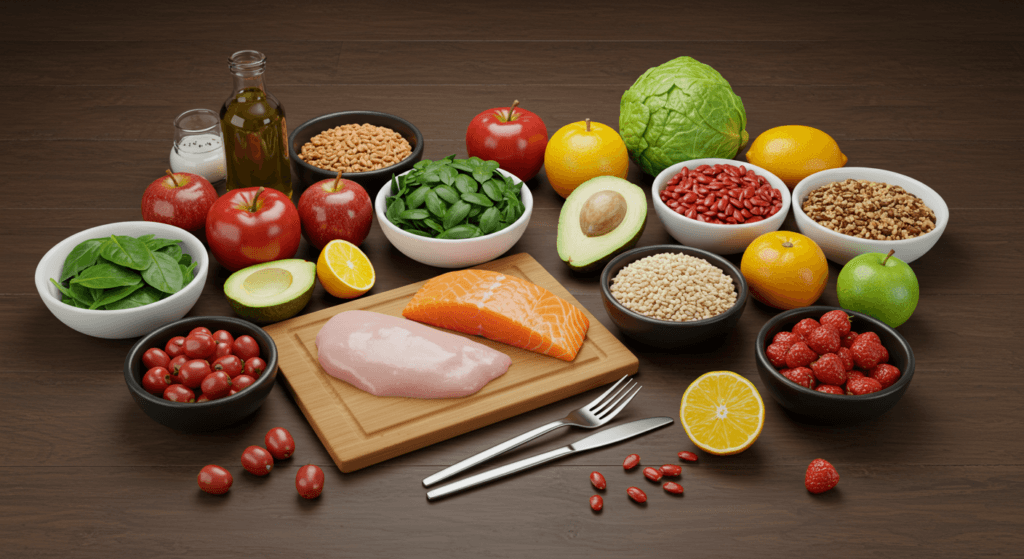
Have you ever wondered if you’re eating as healthy as you could be? With so much conflicting advice out there, it can be tough to know what truly works. In this article, we’ll explore practical and simple tips for healthy eating that anyone can follow.
Whether you’re looking to boost your energy, improve digestion, or just feel better overall, we’ve got you covered.
Focus on Whole Foods
One of the easiest ways to eat healthier is to focus on whole, unprocessed foods. These include:
- Fresh fruits and vegetables
- Whole grains like brown rice and oats
- Lean proteins such as beans, fish and chicken
- Healthy fats from olive oil, seeds and nuts
Whole foods are packed with essential nutrients that help our bodies function at their best. They also tend to be lower in added sugars, sodium, and unhealthy fats compared to processed foods.
Stay Hydrated
Staying hydrated is just as important as eating healthy. Our bodies need water to digest food, regulate temperature, and keep our organs functioning properly. Here are a few easy ways to stay hydrated:
- Carry a reusable water bottle with you
- Drink a glass of water before meals
- Add flavor with slices of lemon, cucumber, or mint
Aim for at least 8 glasses of water a day, but remember that needs can vary depending on your activity level and climate.
Practice Portion Control
Even healthy foods can pile up if we overeat them. Being mindful of portion sizes helps prevent overeating and keeps our energy levels stable throughout the day. Some useful tips for portion control include:
- Using smaller plates to help with portion awareness
- Listening to hunger and fullness cues
- Eating slowly and savoring each bite
Plan Your Meals Ahead
Planning your meals is a solid way to set yourself up for success. When we plan our meals, we’re less likely to grab unhealthy snacks or fast food on the go. Try these tips to make meal planning easier:
- Create a weekly grocery list
- Prep ingredients in advance
- Cook larger batches to have leftovers for busy days
Include a Variety of Nutrients
A balanced diet combines carbs, protein, and fats. Eating a variety of foods helps you get all the vitamins and nutrients your body needs. Try to include:
- Leafy greens for vitamins and fiber
- Lean proteins to support muscle health
- Healthy fats for brain function and energy
Reduce Added Sugars
Many packaged foods contain hidden sugars that can add up quickly. Too much sugar can lead to energy crashes and other health issues. Some easy swaps to reduce sugar intake include:
- Choosing fresh fruit instead of sugary snacks
- Reading labels to spot hidden sugars
- Opt for natural sweeteners like honey or maple syrup—but use them in moderation.
Get Creative in the Kitchen
Healthy eating doesn’t have to be boring! Experimenting with new recipes and flavors can make meals more enjoyable. Try adding herbs and spices to your dishes for extra flavor without extra calories.
Healthy Eating on a Budget
Eating well doesn’t have to be expensive. With a little planning, you can enjoy nutritious meals without breaking the bank. Here are some budget-friendly tips:
- Buy seasonal fruits and vegetables
- Opt for frozen or canned produce when fresh isn’t available
- Purchase staples like beans and grains in bulk
Mindful Eating Habits
Mindful eating is all about being present with what and how you eat. It helps you enjoy your food more and avoid overeating. Some mindful eating techniques include:
- Eating without distractions, like TV or phones
- Chewing slowly to savor flavors
- Recognizing emotional eating triggers
Importance of Fiber in Your Diet
Fiber is key for good digestion and overall health. A diet rich in fiber can help regulate blood sugar levels, support heart health, and promote a healthy gut. Good sources of fiber include:
- Whole grains such as quinoa and whole wheat bread
- Legumes like lentils and chickpeas
- Fruits and veggies like apples and carrots.
Superfoods to Incorporate into Your Diet
Superfoods are rich in nutrients and offer plenty of health benefits. Incorporating them into your diet can boost your immune system and provide key vitamins. Some well-known superfoods are:
- Blueberries for antioxidants
- Spinach for iron and fiber
- Chia seeds for omega-3 fatty acids
FAQ
Takeaway
Eating healthy doesn’t have to be complicated. By making small, gradual changes to your diet, you can enjoy better energy, improved health, and a greater sense of well-being. Start by incorporating whole foods, staying hydrated, and planning your meals. Remember, every step counts!
Ready to take charge of your health? Try incorporating one new healthy habit this week and see how you feel!
If you found this article useful, share it with a friend and subscribe to our free newsletter at the bottom of the page so I can send you more healthy eating tips



